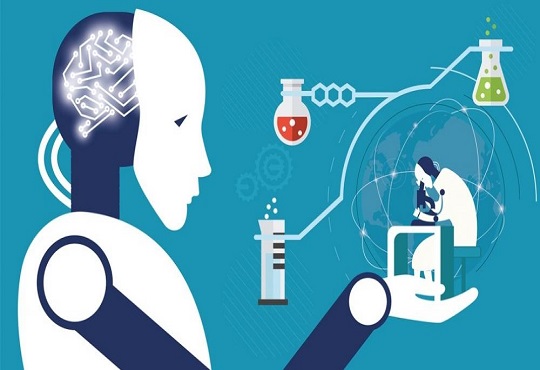Importance of Deep Learning in the Healthcare Industry
Janifha Evangeline | Saturday, 05 February 2022, 07:46 IST

Importance of Deep Learning in the Healthcare Industry
Artificial Intelligence, Deep Learning & ML have gained a lot of attention for quite some time now as these technologies are revolutionizing numerous sectors such as manufacturing, retail, finance, travel, and many others. One such industry which implements these technologies the most today is the healthcare industry. Since health is a priority, the experts in the medical field are continually trying to determine ways to use new technologies and render impactful results.
The healthcare industry leverages Deep learning to provide path-breaking applications. Deep learning collects a huge volume of data that includes medical reports, patient records, & insurance records. It then by applying its neural networks, provides the best outcomes.
Benefits
While Deep learning is a type of ML, which facilitates solving problems, which were not solvable with ML earlier, it provides accurate results by leveraging neural networks to increase computational work. NLP, face recognition, speech recognition are some of the incredible applications of deep learning.
For example, when a user uploads a picture with his friends on Facebook, the app automatically tags his/her friend and suggests them their names. Facebook uses deep learning techniques for recognizing a face and these techniques understand human spoken languages and convert them into text. In the near future, deep learning, in collaboration with the Internet of Things might come up with a gamut of groundbreaking innovations.
Applications
Deep learning is assisting medical professionals and researchers to discover the hidden opportunities in data and to serve the healthcare industry better. Deep learning in healthcare provides doctors the analysis of any disease accurately and helps them treat them better, thus resulting in better medical decisions.
- Drug discovery
“An interesting area in AI is also the use of ‘deep learning’ to predict in-market observations of a drug’s performance in a clinical population. This can help pharma truly understand drug performance at a market level. Deep learning can often detect subtle ‘conditional information that does not have a classification or label until studied. Pharma does not always understand these ‘subtle effects/interactions’ found in drug populations,” says Jasmine Gorimar, Head IT at Boehringer Ingelheim.
Deep learning in healthcare facilitates the discovery of new medicines. The technology analyzes the patient’s medical history and provides the best treatment for them. Moreover, this technology is gaining insights from the patients.
“Additionally, “Pharma has very little incentive to document this - although there are benefits and other reasons for the public/consumer population to intelligently understand drug effects. This difference in public interest versus business interest needs to be balanced carefully. Sometimes pharma gives up very good drugs because they do not yet have sensitive mechanisms to maintain these studies and further propagate them. Big Data and AI might allow the intelligent use of drugs that are probably considered not useful when simply released for all customers,” affirms Jasmine.
“Nevertheless, many big pharma companies are now beginning to recognize that AI, in its own right, represents a burgeoning, new commercial opportunity. The Pharmaceutical industry does invariably have a social obligation to reduce the cost of drugs and reduce the time it takes to get medicines to patients and into the market,” she adds.
- Medical imaging
While medical imaging techniques that include ECG, MRI scans, CT scans are used for diagnosing various diseases such as brain tumor, heart disease, cancer, etc., deep learning enables doctors in analyzing the diseases better and render patients with the best treatment.
- Insurance fraud
Deep learning can also be used in analyzing medical insurance fraud claims. With predictive analytics, deep learning techniques can help in predicting fraud claims, which are likely to occur in the future. Furthermore, deep learning enables the insurance industry to send out discounts as well as offers to their target patients.
- Alzheimer’s disease
While Alzheimer's is a significant challenge faced by the medical industry, the implementation of Deep Learning helps in detecting Alzheimer’s disease at an early stage.
- Genomics
Deep learning can also help in Interpreting genetic variation, Molecular diagnostics, carrier determination, Genome-based therapeutic development, and Risk assessment for complex diseases.
- Computer-Aided Diagnosis (CADX)
The introduction of deep learning techniques in the Computer-Aided Diagnosis (CADX) domain has rendered promising results on numerous medical applications, which include the computerized diagnosis and treatment for organ segmentation, mild cognitive impairment, etc.
One of the major applications of CADx is the differentiation of malignancy/benignancy for tumors. The Computer-Aided Diagnosis (CADX) process offers a 2nd objective opinion for the assistance of medical image interpretation and diagnosis, as it comprises a computerized procedure.
Deep learning techniques can not only help in transforming the design paradigm of the Computer-Aided Diagnosis (CADX) framework but they can also directly uncover features from the training data.
Conclusion
While Artificial Intelligence & deep learning are changing the world of medicine, Deep learning systems allow physicians & healthcare providers faster diagnoses and help in decreasing uncertainty in their decisions. This would further result in avoiding costs and hazards and saving time.
























































.jpg)
.jpg)








.jpg)

.jpg)

.jpg)
.jpg)



.jpg)


.jpg)





























.jpg)

.jpg)
.jpg)

.jpg)
.jpg)

































.jpg)

.jpg)



















.jpg)
















.jpg)












































































































